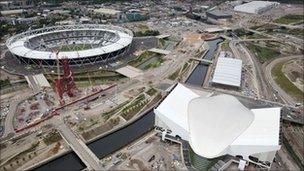Riots thwarted by Blackberry and Twitter chat - police
- Published

The London 2012 Olympic Park is in east London
Police say they prevented attacks by rioters on the Olympic site and London's Oxford Street after picking up intelligence on social networks.
Assistant Met Police Commissioner Lynne Owens told a committee of MPs officers learned of possible trouble via Twitter and Blackberry messenger.
But Acting Commissioner Tim Godwin said he had considered asking authorities to switch off social networks.
He said they provided intelligence but could also be misleading.
A number of politicians, media commentators and members of the police force have suggested that Twitter and Blackberry Messenger (BBM) had a role to play in the riots.
The BBM system is popular among many young people because it is both private and secure - users are invited to join each other's contacts list using a unique PIN, although once they have done so, messages can be distributed to large groups.
Switch off request
Ms Owens said officers had been attempting to sift through an "overwhelming" amount of "chitter chatter" on social networks during last week's riots in London, but some had proved vital.
"Through Twitter and BBM there was intelligence that the Olympic site, that both Westfields [shopping centres] and Oxford Street were indeed going to be targeted," she told the home affairs select committee.
"We were able to secure all those places and indeed there was no damage at any of them."
Mr Godwin said that on Monday, when disorder spread to 22 of London's 32 boroughs, police were receiving a new piece of intelligence every second.
And while much of the information coming via social media "was obviously wrong and rather silly", he said police did considered trying to shut the networks down in order to prevent them being used to organise further violence.
"We did contemplate, I contemplated, asking the authorities to switch it off. The legality of that is very questionable and additionally, it is also a very useful intelligence asset," he said.
"So, as a result of that, we did not request that that was turned off, but it is something that we are pursuing as part of our investigative strategy."
Blackberry has offered to co-operate with police investigating the riots - prompting attacks by hackers angry that the company could be prepared to hand over user data to authorities.
Asked what Blackberry's co-operation would involve, Mr Godwin asked to "plead the fifth", adding: "I would rather not answer that question as it is an investigative strategy."
'Seamless working'
Sir Hugh Orde, president of the Association of Chief Police Officers, which played a key role in coordinating the Met's response, said the riots were "fundamentally different" from the sort of disorder he and the rest of the police force had ever dealt with before.
He told the committee the violence was "multi-site" and "far more spontaneous", and there was almost "non-existent pre-intelligence" which could have helped police manage things differently.
Sir Hugh also defended the way police resources were managed, insisting there was "a pretty seamless working of the system" which was able to meet all the requests made for additional resources.
The senior officers were asked about an apparent spat which broke out between the police and senior ministers over who was responsible for bringing about the surge in officer numbers which returned calm to London.
Mr Godwin insisted that the prime minister and home secretary had been "very supportive" and any differences between them were "overplayed".
"Sometimes the perception of us at loggerheads is not helpful," he added.
- Published12 August 2011
- Published10 August 2011
- Published8 August 2011